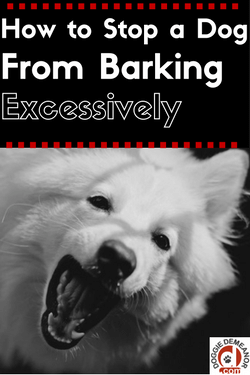 The knee-jerk reaction to stopping a dog from barking excessively is usually to yell, “Stop it Fido!”, or “shut up!” And I totally get that because, let’s face it, excessive barking is annoying!
The knee-jerk reaction to stopping a dog from barking excessively is usually to yell, “Stop it Fido!”, or “shut up!” And I totally get that because, let’s face it, excessive barking is annoying!
But, ask yourself this…has it worked? I guarantee the answer is no. Reason being, when we yell at a barking dog, all they hear is a bunch of noise, and typically view this as us joining in. It makes sense…they don’t understand English, but they do sense a rise in our excitability, and they do hear all the racket we’re making.
So, now…put yourself to a challenge. And, yes, it will be a challenge, but DON’T yell. Instead, put your time and efforts into using a few strategies that have been known to get results. It will take time, and patience, but just keep imagining the bliss at the end of the tunnel.
Stopping a Dog from Barking Excessively
Sometimes the solution is an easy one. But, the first step should always be to get your detective gear on and attempt to figure out the reason behind the barking. Once you figure out the reason, you can then work on an effective solution. If you are absolutely perplexed, don’t worry, you can still use the ideas below to help you out.
Do You Have a Bored Dog? Or, a High Energy Dog?
If you are lucky, you may just have a bored dog, or a dog with too much pent up energy. Both of these things can cause dogs to bark their heads off. The reason I say you are lucky, is because if this is the case, the solution is often an easy one.
 Many, many, many (did I say many?) dogs bark out of boredom, or the frustration of pent up energy. Did you ever notice how people that are always doing things with their dogs always seem to have the most well behaved dogs? This is because their dog is getting out and about, learning social skills, getting exercise, being mentally and physically stimulated, and are void of the boredom that comes from sitting inside all day. Dogs love being with people! These people are working with their dogs, in some cases without even realizing the good that is coming from it.
Many, many, many (did I say many?) dogs bark out of boredom, or the frustration of pent up energy. Did you ever notice how people that are always doing things with their dogs always seem to have the most well behaved dogs? This is because their dog is getting out and about, learning social skills, getting exercise, being mentally and physically stimulated, and are void of the boredom that comes from sitting inside all day. Dogs love being with people! These people are working with their dogs, in some cases without even realizing the good that is coming from it.
Not to go off on a tangent here (but I can’t help myself 🙂 ), I once had a Border Collie mix that was extremely high energy and would bark her head off, driving us absolutely insane. I began letting her run off-leash in a field or at the dog park, taking her places with me in the car, and challenging her with learning new tricks. And, let me tell you, it turned her around completely! After consistently doing these things, she knew she had exciting things to look forward to, and her excessive barking completely stopped.
It could be that you have a small dog that doesn’t necessarily have tons of pent up energy, but nevertheless is still bored. But, even small dogs need some exercise, and a change of scenery from the same four walls in the home. A daily walk can make a world of difference, and you may find that your small dog has more energy than you think. At the very least, spending time outside is a definite boredom buster.
All Dogs Need Mental Stimulation; Give Your Dog a Challenge!
Some ideas are to teach new tricks, offer up a brand new toy, provide things to chew on, fill a Kong toy, play tug of war, use interactive dog games, run an agility course (create your own in the house, or find a facility), hide treats around the house and let your dog find them, or whatever else you think your dog may enjoy.
If you don’t have a lot of spare time, there are still things you can do such as bring your dog to a doggie daycare, hire a dog walker, hire a neighborhood kid to plat or walk with your dog, or borrow your neighbor’s dog for a playdate. My dog is friendly with the two dogs next door, and they often run the fence line together. It takes about 5 minutes, but works wonders as far as pent up energy goes.
A dog that has been mentally and physically stimulated will tend to be calmer, and want to nap more. Remember, dogs sleep more than us humans, and they will be tired! A sleeping dog can’t bark (yes!).
Excessive Barking at Something in Particular
So, maybe you have a dog that excessively barks at something in particular, such as people, dogs, or kids walking outside. You could just shut the curtains and call it a day, but that’s not really an ideal solution, and rather temporary.
First, and foremost, make sure your dog never gets rewarded for excessive barking. For example, if your dog sees a dog outside, begins barking excessively through the door, you would not want to coerce your dog into stopping by bribing him away from the door with a treat. This action would only reinforce the behavior. Think of it as the equivalent of saying, “good boy buddy, way to go in getting your way…make sure you bark again next time, ok?”
So, what do you do? There are two techniques that are commonly used, as discussed below.
Technique #1 – Teach the “Quiet” Command
 Now, hopefully you’re still reading, and not thinking, “oh no, I’ve heard that one before, that doesn’t work!” But, it does! It’s just that most people tend to either give up, or due to time constraints they’re not consistent with it. Barking can be a difficult behavior to curb, so if you want it corrected you need to stick with it, be consistent, and don’t show your dog your frustration in the process (they will sense it!).
Now, hopefully you’re still reading, and not thinking, “oh no, I’ve heard that one before, that doesn’t work!” But, it does! It’s just that most people tend to either give up, or due to time constraints they’re not consistent with it. Barking can be a difficult behavior to curb, so if you want it corrected you need to stick with it, be consistent, and don’t show your dog your frustration in the process (they will sense it!).
In this approach you teach your dog the meaning of the word “bark”, so you then have the ability to teach the word “quiet” once he stops. If your dog already knows the “speak” command you’ll be ahead of the game!
- When your dog begins to bark, use a command such as “bark” (or “speak”) and offer him a treat.
- Repeat the above until your dog can bark on command (your dog should reliably know the “bark” command before moving on.)
- Command your dog to “bark”, but this time do not offer the treat. Now, use the command “quiet”. Once he stops barking, offer the treat. It may take some time for him to stop, but just wait it out.
It’s important to practice daily for many weeks until your dog can reliably “bark”, and reliably be “quiet” on command. Practice, practice, practice, even once he gets it down, because you don’t want it to be forgotten!
It will be tougher to get your dog to listen to the “quiet” command when he is excitably barking at that dog outside, or those kids on their bikes, but practice makes perfect. Ways you can make your hard work backfire are by not staying calm yourself, and by yelling the “quiet” command, instead of calmly and firmly speaking it. If you want your dog to listen, you need to be calm, but still firm.
(Note: when I train my dog new tricks I often use a command, along with a hand signal. I find this works well and helps him recognize what he is expected to do. You may want to keep this in mind for your dog too.)
Technique #2 – Desensitize Your Dog to the Cause of the Barking
So, Fido is barking like crazy at the lady with the dogs again…what to do? In this approach you teach your dog that seeing the lady outside is really no big deal.
Once you know the root of the cause is coming your way, but still far enough away that your dog has not begun barking, begin feeding your dog lots of treats. The idea in this approach is to let the thing that sets off the barking get closer and closer to your dog, while you reward your dog with treats for not barking. When the person, animal, or whatever was the root of the barking disappears from view, you then stop the treats.
The result is that your dog will learn that seeing the very thing that set off his barking, will actually bring very good things to him (treats). Eventually, he will learn not to bark without being treated, so you won’t have to be a treat dispenser forever!
Barking in Elderly Dogs
 My parents used to have a Pug (sadly, passed away now) that would come stay with us whenever they went on vacation. We loved her like any of our fur children; she was a very good girl. However, without fail, in the middle of the night she would begin barking, and there went any hopes and dreams (literally) of a good night’s sleep. This behavior only started happening in her elderly years.
My parents used to have a Pug (sadly, passed away now) that would come stay with us whenever they went on vacation. We loved her like any of our fur children; she was a very good girl. However, without fail, in the middle of the night she would begin barking, and there went any hopes and dreams (literally) of a good night’s sleep. This behavior only started happening in her elderly years.
It wasn’t a matter of a training issue; rather she had some age-related issues. For starters, she became deaf in her old age and could no longer hear herself bark. There was also some speculation that she had moments of disorientation that perhaps caused confusion as to where she was. In addition, she had a bit of arthritis pain.
Some older dogs can develop cognitive dysfunction syndrome, which is much like dementia. These are all things to consider if you have an elderly dog that has suddenly gotten into a barking habit.
Do you have a crazy barker? If so, I’d love to hear your story!





